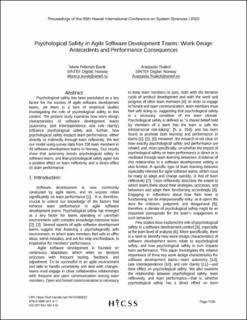Psychological Safety in Agile Software Development Teams: Work Design Antecedents and Performance Consequences
Peer reviewed, Journal article
Accepted version
Permanent lenke
https://hdl.handle.net/11250/2994091Utgivelsesdato
2022Metadata
Vis full innførselSamlinger
- Publikasjoner fra CRIStin - SINTEF AS [5638]
- SINTEF Digital [2381]
Originalversjon
Proceedings of the 55th Hawaii International Conference on System Sciences 2022 10.24251/HICSS.2022.880Sammendrag
Psychological safety has been postulated as a key factor for the success of agile software development teams, yet there is a lack of empirical studies investigating the role of psychological safety in this context. This study examines how work design characteristics of software development teams (autonomy, task interdependence and role clarity) influence psychological safety and further how psychological safety impacts team performance, either directly or indirectly through team reflexivity. We test our model using survey data from 236 team members in 43 software development teams in Norway. Our results show that autonomy boosts psychological safety in software teams and that psychological safety again has positive effect on team reflexivity and a direct effect on team performance.

